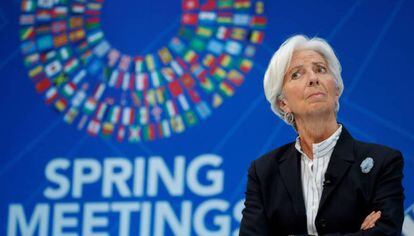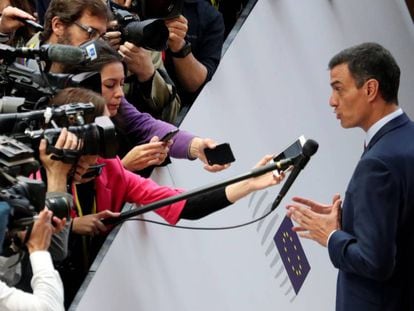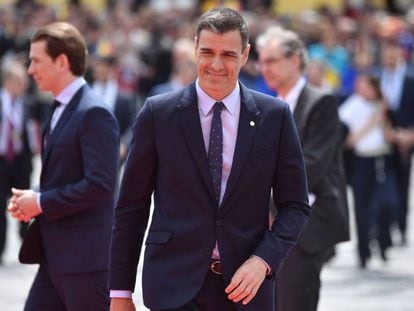A team for Europe that does not excite
The back-room method of choosing the candidates for the top European Union jobs has produced a list of names that prompt little enthusiasm, but could still produce some surprises

Since we are in July, in pre-season and hence the time of new signings, it might be appropriate to use a soccer comparison to analyze the team recently selected by the heads of state and government that form the European Council, which in this case could be considered the governing board of a soccer club called: the European Union. First of all, it must be said that the European leaders rejected the most direct election process, based on the popular vote of the club’s fans (the process of Spitzenkandidaten), and decided on the new signings by the back-room method following three days of secret negotiations and several weeks of prior bilateral consultations.
Thus, unconvinced on the merits of bottom-up democracy, these leaders have returned to the old-fashioned, and much criticized, method of choosing players.
This is a shame because the fans had voted for Weber, a solid player although very problematic, but also for Timmermans, who is one of the best soccer players that there is in the market, and to dismiss him is a tragedy. In particular because his candidacy was blown up by the most sinister and reactionary members of the board (the Visegrad four and the unruly Italian).
Unconvinced on the merits of bottom-up democracy, these leaders have returned to the old-fashioned, and much criticized, method of choosing players
So, the proposed striker, or in this case the female forward (women’s soccer is on the rise and the World Cup has just finished), is Ursula von der Leyen. A player that no one had in the pool, who comes with many problems from her old club. There she scored very few goals (the Ministry of Defense that she directs is in worse condition than when she entered) and garnered a reputation for going out to drink excessively (that is to say, for hiring external consultants and spending too much on navy sailing ships).
Then there is perhaps the most important position: the central midfielder, also called the playmaker. The new signing here Christine Lagarde, from France. She comes from a giant in the game, the International Monetary Fund, and has credentials. She communicates well and has charisma, making her well qualified to be captain for the team. But when it really comes to understanding how soccer works (i.e. monetary policy and theory) she falls short of impressing. This begs the question: Will she be able to impose her authority in the locker room and in front of the press?
And what to say about the goalie: Charles Michel, a Belgian (just like Courtois) coming off from a terrible season at his old club. First, he joined a team full of radical, pro-independence hooligans, and after that, he let the opponents score so many goals (they had a very bad result at the May elections) that his continuity in the team was on a tightrope. Michel is still young and is hardworking, but if he continues to concede too many goals, he will really struggle holding the crucial position of president of the European Council.
Josep Borrell is a Ramos. His position should be in Brussels in the middle of the action rather than on a plane between Beijing, Brasilia, Pretoria and Washington
Finally, we have Josep Borell. A superclass. Renowned and respected, he represents the best in modern Spanish soccer, although it is true that the years have weighed heavily on him. The extraordinary thing is that instead of recruiting him as center-back (in charge of the main pillar of the team, that is the euro and the economic matters), the governing board want him to be right-back. Up and down the pitch, traveling around the world.
Borrell is a Ramos. His position should be in Brussels in the middle of the action (where he might even be able to score a goal or two), rather than on a plane between Beijing, Brasilia, Pretoria and Washington.
The truth is that the new team does not excite (not even the German fans are content with the appointment of Von der Leyen), and worse, even the coach (which, in this metaphor, would be the European Parliament) is angry. Right now, he is deliberating as to whether to lower his head and accept the players the board has signed him or abandon the ship before the season even starts. If he does, no one would reproach him. Like Guardiola, he believes in a centuries-old soccer philosophy called Parliamentarianism, which has been undermined. The board promised him a renewed and vigorous team and he has found himself with the same uninspiring players as always, and with the opinion of the fans in the garbage can.
However, despite all of this, the season does not have to end in a disaster. It is clear that all of the new recruits feel the colors of the club. The four (two women in key positions and two men) are authentic Europeanists and can surprise us. They were better candidates in the market for sure. But the EU is a complicated club full of conflicting interests and it is not easy to make decisions that satisfy everyone.
If in the end these recruits remain, we will have to offer them the benefit of the doubt. Perhaps in the end they will surprise us, start to play well and stand up against the Chinese, Russian and American teams. Of course, for now, their names do not raise much passion and if in the end they sign there will be very few people at their opening match. Only the EU’s most loyal and uncritical fans.
Miguel Otero Iglesias is a senior analyst at the Elcano Royal Institute.













































